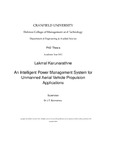JavaScript is disabled for your browser. Some features of this site may not work without it.
| dc.contributor.advisor | Economou, John T. | |
| dc.contributor.author | Karunarathne, L | |
| dc.date.accessioned | 2013-10-08T14:45:13Z | |
| dc.date.available | 2013-10-08T14:45:13Z | |
| dc.date.issued | 2013-10-08 | |
| dc.identifier.uri | http://dspace.lib.cranfield.ac.uk/handle/1826/8038 | |
| dc.description.abstract | Electric powered Unmanned Aerial Vehicles (UAVs) have emerged as a promi- nent aviation concept due to the advantageous such as stealth operation and zero emission. In addition, fuel cell powered electric UAVs are more attrac- tive as a result of the long endurance capability of the propulsion system. This dissertation investigates novel power management architecture for fuel cell and battery powered unmanned aerial vehicle propulsion application. The research work focused on the development of a power management system to control the hybrid electric propulsion system whilst optimizing the fuel cell air supplying system performances. The multiple power sources hybridization is a control challenge associated with the power management decisions and their implementation in the power electronic interface. In most applications, the propulsion power distribu- tion is controlled by using the regulated power converting devices such as unidirectional and bidirectional converters. The amount of power shared with the each power source is depended on the power and energy capacities of the device. In this research, a power management system is developed for polymer exchange membrane fuel cell and Lithium-Ion battery based hybrid electric propulsion system for an UAV propulsion application. Ini- tially, the UAV propulsion power requirements during the take-off, climb, endurance, cruising and maximum velocity are determined. A power man- agement algorithm is developed based on the UAV propulsion power re- quirement and the battery power capacity. Three power states are intro- duced in the power management system called Start-up power state, High power state and Charging power state. The each power state consists of the power management sequences to distribute the load power between the battery and the fuel cell system. A power electronic interface is developed Electric powered Unmanned Aerial Vehicles (UAVs) have emerged as a promi- nent aviation concept due to the advantageous such as stealth operation and zero emission. In addition, fuel cell powered electric UAVs are more attrac- tive as a result of the long endurance capability of the propulsion system. This dissertation investigates novel power management architecture for fuel cell and battery powered unmanned aerial vehicle propulsion application. The research work focused on the development of a power management system to control the hybrid electric propulsion system whilst optimizing the fuel cell air supplying system performances. The multiple power sources hybridization is a control challenge associated with the power management decisions and their implementation in the power electronic interface. In most applications, the propulsion power distribu- tion is controlled by using the regulated power converting devices such as unidirectional and bidirectional converters. The amount of power shared with the each power source is depended on the power and energy capacities of the device. In this research, a power management system is developed for polymer exchange membrane fuel cell and Lithium-Ion battery based hybrid electric propulsion system for an UAV propulsion application. Ini- tially, the UAV propulsion power requirements during the take-off, climb, endurance, cruising and maximum velocity are determined. A power man- agement algorithm is developed based on the UAV propulsion power re- quirement and the battery power capacity. Three power states are intro- duced in the power management system called Start-up power state, High power state and Charging power state. The each power state consists of the power management sequences to distribute the load power between the battery and the fuel cell system. A power electronic interface is developed with a unidirectional converter and a bidirectional converter to integrate the fuel cell system and the battery into the propulsion motor drive. The main objective of the power management system is to obtain the controlled fuel cell current profile as a performance variable. The relationship between the fuel cell current and the fuel cell air supplying system compressor power is investigated and a referenced model is developed to obtain the optimum compressor power as a function of the fuel cell current. An adaptive controller is introduced to optimize the fuel cell air supplying system performances based on the referenced model. The adaptive neuro-fuzzy inference system based controller dynamically adapts the actual compressor operating power into the optimum value defined in the reference model. The online learning and training capabilities of the adaptive controller identify the nonlinear variations of the fuel cell current and generate a control signal for the compressor motor voltage to optimize the fuel cell air supplying system performances. The hybrid electric power system and the power management system were developed in real time environment and practical tests were conducted to validate the simulation results. | en_UK |
| dc.subject | Unmanned aerial vehicles | en_UK |
| dc.subject | Power systems | en_UK |
| dc.subject | Power management systems | en_UK |
| dc.title | An intelligent power management system for unmanned earial vehicle propulsion applications | en_UK |
| dc.type | Thesis or dissertation | en_UK |
| dc.type.qualificationlevel | Doctoral | en_UK |
| dc.type.qualificationname | PhD | en_UK |
